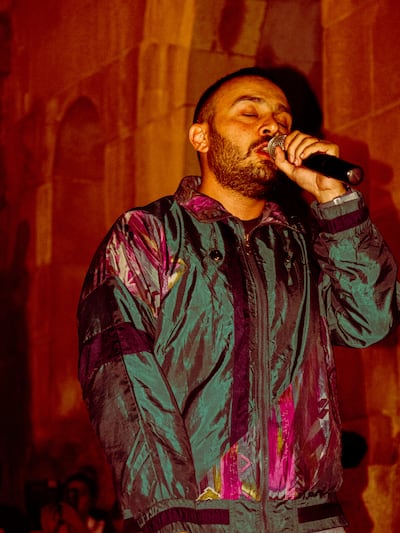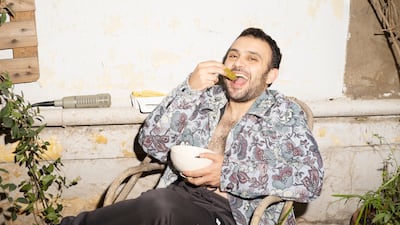What does it mean to help bring new life to the world when death is seemingly at your doorstep? And how can one reconcile the satisfaction of finally gaining some inner peace amid the chaos and carnage outside?
These are some questions Laith Al Husseini, better known as the acclaimed rapper The Synaptik, wrestles throughout the course of his new album Al Taman. The 20-song collection is distinguished by delving into deeply personal matters, from the challenges of sustaining mental well-being to coming to terms with life’s disappointments, rarely heard on an Arabic hip-hop album.
Al Taman is also one of the first major musical releases emerging from Palestine amid the ongoing Israel-Gaza war. Speaking to The National from his home in Ramallah, the West Bank, Al Husseini says he has been “keeping it together” during the war.
More than just preserving his own peace of mind, his family's has been front of mind. "My wife gave birth to my first child in Jerusalem on October 11 and ever since the war, I have been staying home with the family in my village here in Ramallah," he says.
aka The Synaptik
"It has been at times, a really isolating experience because we could not really venture more than 5km around us and, because of the war, everything is closed. All the shows I had planned in Palestine have been cancelled.
“But despite all that, I feel deeply happy inside because I have my first-born son here with me. I move from these feelings of fear and loss about what is happening in the war, whose dimensions we have all yet to really understand, but finding this sense of inner peace and hope from the arrival of our child. My life these days has been moving within these two mind states."

That sense of duality is also a hallmark of Al Husseini’s career. Born in Jordan, he was a fastidious medical student in Amman while rocking stages across the region as The Synaptik. After graduating in 2019, the microphone took precedence over the stethoscope, and Al Husseini went on to cement his career with a string of acclaimed albums.
Where his last release, 2021's Al Qamar Wal Moheet (The Moon and the Ocean), is a suite of songs tracking his attempt to balance the hedonism of a profession in music with the strict discipline of medical school, Al Taman comes to terms with the paradox of joy as a new father in a country ravaged by war.
“I don’t really set out to explore these concepts specifically and this is particularly the case with Al Taman,” he says. “That’s because I started writing and recording the songs in 2022 and I finished the last song in June. My world has changed since then, so I just keep writing these songs to express myself and make some sense of what I am feeling.”
Al Husseini says it’s no coincidence the songs recorded in the wake of the war take on heavier themes. Tiji Ana Wayaki, featuring Palestinian singer Kokym, incorporates peppy Arabic folk percussion that helps disguise some of the fatalism of the lyrics.
"That song really details the boredom that a lot of young Palestinians feel because of the war," he says. "The song is like a conversation between friends who are trying to find any way of having some relief. At times, that can come from simply laughing out loud because of how bad life is and how you are so emotionally drained."
Besmek, with its strident rhythms and woozy keyboards, forms part of the emotional core of the album in which Al Husseini comes to terms with the decision to move to Palestine from Jordan five years ago to further his musical aspirations.

With his extended family staying in the safer confines of Jordan, does he regret that decision? “Not really and this song is essentially about me coming to peace with that and owning my decision," he says.
"I came here to build my career as a musician and I plan to continue doing this despite the situation. The lyrics are quite direct because it has me telling myself, and maybe others as well, that instead of complaining about your situation you can make the changes you need. A war can happen and change things but at the end of the day, life doesn't wait for you."
Yet despite some of the hard truths delivered, Al Husseini feels Al Taman – meaning the price – is ultimately a positive album. "Everybody has a price to pay for making decisions in life and it's really about being OK with that," he says. "These songs are all about finding peace after traumatic experiences and finding the will to keep remotivating ourselves and find new reasons to keep going."
Giving voice and melodies to that important and messy inner work defined Al Husseini’s work from the outset, making him one of the rare Arab musicians who openly talks about and advocates for mental health in their craft.
His 2018 breakout track Ritalin remains a monumental piece of Arabic hip-hop in that it marked one of the first times an Arab artist openly detailed their mental health conditions.
Named after a medication used to treat attention deficit hyperactivity disorder (ADHD), the song helped break some of the taboo surrounding discussions about mental health in the Arab world.
"From a young age, I have been dealing with depression and anxiety as well as the side effects of medication. I wrote the song because I was tired of doing it in silence and in secret," he says.
"I didn't know that it would resonate with so many people and it remains one of the best things that ever happened to me. Not only did it help me share with people what I was going through, but it also encouraged them to do the same. When they tell me how it helped them unburden that secret, which is really crushing, it made me so happy and showed me what a song can really do."
Al Husseini encourages more Arab artists to publicly share their vulnerabilities. "Where we come from, mental health is still taboo to talk about and I am hopeful this will change with time," he says. "Personally, I love how the newer generations, from Gen Z onwards, are really being more open, creative and even defiant when it comes to advocating for their rights and mental health.
“With the world being as dark as it is right now, I am encouraged at how organised and action-oriented they are when it comes to fighting injustice or bringing important issues to light. Then again, this is something all of us should contribute to."
Saeed Saeed is a 2024-25 Rosalynn Carter Mental Health Journalism Fellow


